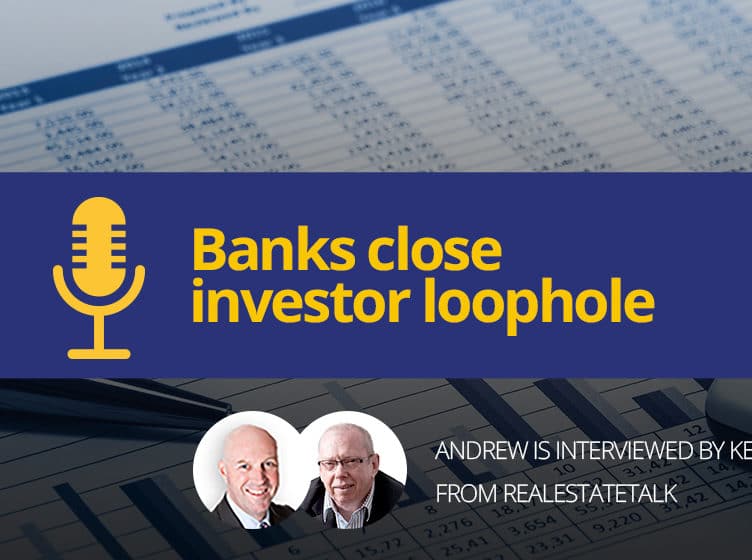Banks close investor loophole [AUDIO INTERVIEW]

Note: There are several other experts on the show, so if you’d like to skip to Andrew’s comments – please listen from 8:20min onward
Kevin: I was interested to see during the week that Westpac is closing a loophole to stop property buyers using a combination of personal loans and mortgages to fully fund deposits or even to top up shortfalls if off-the-plan apartments are revealed by the bank at less than purchase price. Andrew Mirams from Intuitive Finance, a regular on the show, joins me.
Andrew, thanks for your time and welcome to the show once again.
Andrew: Thanks, Kevin. Pleasure.
Kevin: Interesting, this. Alarm bells seem to be going off a little bit. What’s behind this?
Andrew: Probably the bank has… And Westpac has been the last one to move. The others have all closed these loopholes as part APRA’s looking into, I guess, just responsible lending. They’ve just shut down the ability to make a personal loan and personal lines of credit as genuine savings.
Whenever someone is looking to buy a home, they have to have at least 5% of genuine savings, so what the banks and regulators and everyone is looking for is clients aren’t over-committing themselves. And by doing that, by being able to prove the genuine savings test, that they’ve been able to start to put some money aside, and there, they take from that a bit of a viewpoint that they should be a good credit risk in terms of meeting their loan repayments in the future. If you start to mix aggregate debts and things like that, it’s harder to get a true form of whether they’re going to be able to do that.

Gaining control over increasing prices
Kevin: Just making it a little bit harder all the time, I guess, for investors, isn’t it? It seems to be these levers that they’re pulling to try and get some control over increased prices, Andrew?
Andrew: Absolutely. And in days past, just pre-GFC, we had 105% and 110% home loans, 100% home loans were existent. Part of that clean out, it got rid of all of those. There were a few little loopholes that were brought in for people such as high-income earners who had separated from a partner and were trying to reestablish into the market. They had good incomes but because of circumstances didn’t have the access. These things were brought into play.
 They have probably been used more recently as the markets have grown and people have found it harder and harder by some banks and strategic brokers out there just trying to really help clients get in in any way shape or form to get there.
They have probably been used more recently as the markets have grown and people have found it harder and harder by some banks and strategic brokers out there just trying to really help clients get in in any way shape or form to get there.
I don’t think it’s a bad thing and the bank bashers will probably say, “The banks want it all their way.” This isn’t a bank restriction. This is very much brought down by the regulators sitting above, that we’re seeing changes being enforced over the last 18 months and probably still have a little bit to go.
Will rates increase?

Kevin: Andrew, could this also be a sign that the regulators think that rates are on the increase and they could be a bit concerned that people may be borrowing too much and not going to be able to repay some of these loans back?
Andrew: Yes and no, Kevin. Yes, of course, we’ve had record low interest rates, so there’s no doubt that with low interest rates, if we get a couple of increases then what’s the jolt going to be? Are people going to be able to afford that?
Why I say no is the bank servicing rates and the way you’ve gone in and asked for a loan from a bank, they’re still being serviced. The majority of their loans that are around 7.25 up to 8% depending on the lender. They actually have that factored into their servicing calculations and are doing that to make sure they’re not over-committing people.
The rates are there, so they’re already servicing in that. I think there’s a bit more workaround just analyzing people’s expenditure and making sure that their lifestyle actually meets their income requirements and then their ability to fund their debt.
What does this mean for our borrowing power?
Kevin: Are there many 100% home loans at present?
Andrew: Not that I’m aware of, Kevin.
Kevin: No.
Andrew: Look, we don’t lots of just first-home loans and things like this, and I’ve seen in some of the reports and a lot of people have made a bit of noise about that, and they’re probably people who work in those markets trying to get people in. That’s not really a market that I do a lot of work in.
There’s no such thing as a 100% home loan where you can get a home for $500,000 and borrow $500,000. That’s was closed down after the GFC. Just pre-GFC, though, there were loans available up to 110% of the value of the property on the old premise that property always goes up. We saw through America and the UK and parts of Australia even when the GFC came through that that’s a fallacy. It just doesn’t work just like that.
Kevin: We’re talking here about Westpac doing this. Are there any indication the others are likely to follow suit.

Andrew: The other lenders have already probably done it more. They were less aggressive in doing it and weren’t really doing that. Westpac had seen this is a bit of a niche in their market and the ability to provide this and do things like that. It’s just now they’ve been alerted to it by the regulators, and they’ve said, “Okay. We probably agree. That doesn’t fit the full piece of responsible lending practice.” They’ve just shut it down for now as the regulators continue to take a stronger hold to ensure that the market doesn’t enter a boom-bust cycle.
Kevin: Yes. How are brokers generally reacting to this type of tightening up because it’s been going on for a while, hasn’t it?
Andrew: Yes, it has been. You’re right. Like I said, there are banks and brokers that have advocated doing this and just getting that little bit extra, $10,000, $15,000, $25,000, $30,000 –whatever it might be – on a personal loan to get them in to fund their stamp duty or something.
That’s part of the frenzy of what the regulators don’t want people to commit to if they can’t save the money and they don’t have other means, then taking more debt just to get in because of otherwise “We’ll miss out on the market,” I think probably isn’t a bad thing.
Hopefully, it will save some people from some potential gloom if we do get rate raises and they can’t manage all their debts, because a personal loan is generally taken over somewhere between 5 years to 7 years, maybe up to 10 years depending on the lender. So it has a higher interest rate and a shorter repayment period, so that coupled with then your mortgage expenses if the rates start to rise, I think it can put people at risk.
My personal opinion is I don’t think it’s a bad thing, but will it mean some people will miss out? Yes, it will, but arguably they’re also saving them from putting them at risk at well.
 Kevin: Yes. We have a history – haven’t we – of a really good banking system, tight regulations, and we shouldn’t complain about that, and I know you’re certainly not doing that. But is this the new norm – that of increased deposits, good record of saving, the ability to even service higher interest rates? Andrew, is that the norm going forward?
Kevin: Yes. We have a history – haven’t we – of a really good banking system, tight regulations, and we shouldn’t complain about that, and I know you’re certainly not doing that. But is this the new norm – that of increased deposits, good record of saving, the ability to even service higher interest rates? Andrew, is that the norm going forward?
Andrew: Yes. I think it’s going to be, Kevin. I think at least while we still see, in particular, the two major capitals in Melbourne and Sydney really performing strongly. I think there will be continued concern that we don’t want people just rushing in and buying. I think there will be more scrutiny.
Like I said, there’s a lot of work around just being able to analyze people’s actual spending habits and their consumption; what they actually do spend on a monthly basis and not overcommitting them. I think we’ll see continued work around interest-only piece and especially people wanting an interest only home loan and things like that.
I think the scrutiny around those that we’re not overcommitting people, in the long-term, it might be okay and affordable today but what about in three or five years when an interest-only term has come off. You have potentially higher interest rates. You might have been a couple then but you’ve gone back to one wage because you’ve had a baby and things like that, and all of a sudden, you just can’t make your commitment.
That’s why the regulators are working hard to make sure that the market remains strong and consistent, again, to avoid that boom-bust cycle.
Kevin: Well said, mate. Always good talking to you. Andrew Mirams from Intuitive Finance. Thanks for your time, mate.
Andrew: My pleasure, Kevin. Have a great day.
Full transcript of the interview can be found on www.realestatetalk.com.au
